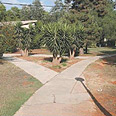
First ever Arab-Muslim becomes kibbutz member
Qalansawe's Amal Carmiya accepted as new member of Kibbutz Nir Eliyahu. Kibbutz residents say she is 'exceptional person'
Neta Be’eri, the movement’s demographic growth team coordinator refused to refer to this as an historical occurrence. “This is not a symbolic or demonstrative act and this is also not part of some credo of ours. This is a process that matured naturally.”
The ties between Carmiya and the Sharon-region kibbutz started 18 years ago when she sent her two children Aya and Adam to the kibbutz kindergarten, just like some other families from nearby Arab communities do. Eventually, when the kibbutz looked for a hired nurse, Carmiya was chosen for the position. In 1997 Carmiya temporarily moved to the kibbutz and a few years later, turned into a resident.
Last September when the kibbutz became privatized, it opened its doors after many years to absorbing new members. New residents must become members of the kibbutz union and build their homes on their own.
“The idea to accept Amal evolved simultaneously in her mind and in ours and became clear last year after the option of accepting new members at the kibbutz arose,” said Be’eri.
“After years of acquaintanceship we are very satisfied with her and love her. We do not believe that she represents something, she is simply an exceptional person who adapted wonderfully to kibbutz life; she is a part of us and so are her two children. Aya and Adam are in the youth class. Adam, who is a sought after soccer player, is loved and accepted.”
According to Be’eri, the fact that Carmiya was chosen has no connection to her background. “The kibbutz members voted for Amal the person, not Amal the Arab.”
Carmiya herself feels entirely like a member of the kibbutz. “With the complicated situation in Israel, I feel that this is the place, these are the people and this is the way that fits me best,” she said. According to Carmiya, her family has mixed feelings regarding her way of life.
“They have already learned to accept the way I am. They comment about my children’s education here and there, and think that maybe my daughter needs to return to the village to find a husband, but all of this won’t change my decision to live on the kibbutz,” she said.
What about Carmiya’s children? “When the day comes, they will make a decision about their path in life,” said Carmiya. “We do not deny the fact that we are Muslim. We fast during Ramadan and celebrate all the holidays and the children end up more rewarded and enriched by this. They enjoy both worlds. My children are universal,” she added.
According to Be’eri, Carmiya’s membership in the kibbutz is likely to turn into the beginning of a new phenomenon. “Maybe when people realize that the demon is not so bad, and that Arabs don’t have horns, there will be more of these cases."










